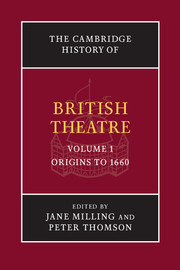Book contents
- Frontmatter
- PART I PRE-ELIZABETHAN THEATRE
- PART II ELIZABETHAN THEATRE
- PART III JACOBEAN AND CAROLINE THEATRE
- 13 Working playwrights, 1580–1642
- 14 Theatre and controversy, 1603–1642
- 15 The Stuart masque and its makers
- 16 Clowns, fools and knaves: stages in the evolution of acting
- 17 Thomas Middleton's A Game at Chess: a case study
- 18 The condition of the theatres in 1642
- 19 Theatre and Commonwealth
- Works Cited
- Index
- References
19 - Theatre and Commonwealth
from PART III - JACOBEAN AND CAROLINE THEATRE
Published online by Cambridge University Press: 28 March 2008
- Frontmatter
- PART I PRE-ELIZABETHAN THEATRE
- PART II ELIZABETHAN THEATRE
- PART III JACOBEAN AND CAROLINE THEATRE
- 13 Working playwrights, 1580–1642
- 14 Theatre and controversy, 1603–1642
- 15 The Stuart masque and its makers
- 16 Clowns, fools and knaves: stages in the evolution of acting
- 17 Thomas Middleton's A Game at Chess: a case study
- 18 The condition of the theatres in 1642
- 19 Theatre and Commonwealth
- Works Cited
- Index
- References
Summary
The outbreak of civil war in 1642 and the subsequent establishment of a commonwealth or republic in 1649 are often assumed to have resulted in a virtual hiatus in dramatic activity. On 2 September 1642, just nine days after Charles I had raised his standard at Nottingham, it was decreed that public sports and playgoing should be for the moment suspended. In its attempt to eradicate ungodly leisure pursuits, the Act could be interpreted as the triumph of the puritan anti-theatrical view which through the decades since the establishment of professional theatre had been articulated in the writings of Stephen Gosson, Philip Stubbes, William Rackin, William Prynne and others. Indeed, the wording of the Act, as do later ordinances against the theatre, recalls briefly the familiar negative associations of theatricality. Nevertheless, the ordinance is not as absolute as it may appear. It contains no reference to actual closure of theatres and the qualification ‘while these sad causes and set times of humiliation do continue” implies that the measures are temporary. The injunction is less an expression of anti-theatrical polemic than a pragmatic expedient, impelled by the exigencies of a country at war. As with Elizabethan regulation of the theatre, it betrays the familiar apprehension of the potential in mass gatherings for riotous behaviour. Given the nature of the political crisis in 1642, the decision to prohibit public theatre performance would seem unremarkable.
- Type
- Chapter
- Information
- The Cambridge History of British Theatre , pp. 458 - 476Publisher: Cambridge University PressPrint publication year: 2004
References
- 3
- Cited by

